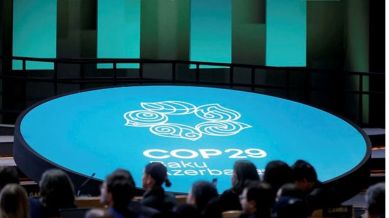Stay updated with the latest - Click here to follow us on Instagram
‘If contribution to degradation is unequal, responsibility must also be unequal’ – India slams developed countries at ICJ hearing
India also urged the ICJ to avoid creating new obligations that go beyond the existing climate-change framework.

India slammed developed countries for causing the climate crisis during a landmark hearing at the International Court of Justice (ICJ) on Thursday, and highlighted the need for equitable global action on climate change.
The court is examining what legal obligations countries have to address climate change and the consequences if they fail.
monthly limit of free stories.
with an Express account.
India argued that countries with negligible historical emissions should not be expected to bear the same burden in addressing climate change. “It is unjust to expect countries with negligible historical emissions to bear an equal burden in mitigating climate change,” India stated in its submission to the ICJ.
Luther M. Rangreji, Joint Secretary in the Ministry of External Affairs (MEA), presented India’s position, saying, “Climate finance provided by developed nations is inadequate to meet the needs of developing countries in adapting to and mitigating climate change.”
India also criticised developed nations for their role in creating the climate crisis. During the hearing, which examined countries’ legal obligations to tackle climate change, India argued that developed nations hold greater responsibility due to their historical exploitation of resources. “If the contribution to degradation is unequal, the responsibility must also be unequal,” said Rangreji.
Highlighting the disproportionate impact of climate change on developing nations, Rangreji noted that these countries contribute far less to the problem yet suffer the most. He emphasised that developed nations have the technology and financial resources to address the crisis but often fail to act justly. “Countries that have reaped developmental benefits from exploiting fossil fuels now demand that developing nations refrain from utilising their own natural energy resources,” Rangreji added.
India also condemned the failure of developed countries to fulfil their climate-finance pledges. It noted that the $100 billion promised in 2009, along with increased adaptation funding, had yet to materialise.
Terming the new climate-finance package for the Global South agreed at COP29 in Azerbaijan’s Baku “too little, too distant” to meet the urgent needs of developing countries, India said, “Any fair or meaningful assessment of obligations of states cannot be conducted without simultaneously assessing the climate-finance support provided.”
While reaffirming its commitment to the Paris Agreement, India stressed the limitations of overburdening its citizens, particularly as it strives to achieve sustainable development goals for its large population.
The ICJ hearing, initiated by Pacific island nations and Vanuatu, involves submissions from over 98 countries. Although the court’s advisory opinion will not be legally binding, it is expected to carry significant weight in the global fight against climate change.
Though non-binding, the ICJ’s opinion could set a moral and legal benchmark in the global fight against climate change.
(With Inputs from PTI)